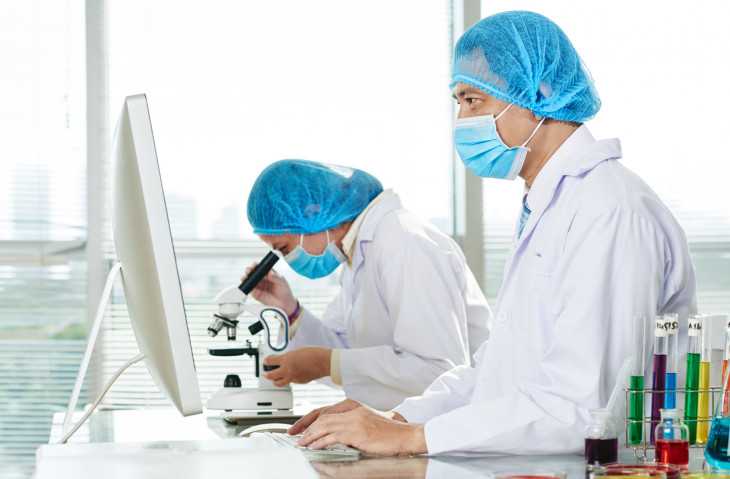Microbiologists study the characteristics and growth of viruses and other microscopic organisms. Having a bachelor's degree in microbiology or a similar related field is necessary for those wishing for an entry level job as a microbiologist. Those who wish to work in universities or conduct independent research require a Ph.D.
Education & Training
A bachelor's degree in microbiology, cell biology or biochemistry is required for those studying to be microbiologists. Numerous universities and colleges offer degree programs in microbiology and a variety of biological sciences.
The majority of microbiology majors take introductory courses in microbial physiology and microbial genetics prior to taking advanced classes in virology and environment microbiology. Additional required classes include: chemistry, biochemistry and physics. It is imperative that microbiologists have a vast comprehension of the sciences. Classes in computer science, mathematics and statistics are vital as complex data analysis is a common part of the job.
It is vital for prospective employers to have significant laboratory experience prior to gaining employment. The majority of undergraduate programs in microbiology include additional recommended coursework and a mandatory laboratory component. Individuals can gain experience via prospective employers such as drug manufacturing companies and through internships.
Typically, a Ph.D. is required by microbiologists in order to work in universities or colleges and conduct independent research. Students studying microbiology often specialize in a specific subfield such as immunology or bacteriology. Completing a dissertation or thesis, along with laboratory research are included along with class work.
Training
It is common for Ph.D. holders to initiate their career in temporary postdoctoral research positions. Typically, they work with experienced scientists during their postdoctoral appointment, helping them develop a broader understanding and learn about a variety of specialties.
These postdoctoral positions provide extensive opportunities to publish research findings. In order to obtain a permanent position in basic research, a solid record of published research is essential; particularly for those seeking a permanent faculty position at a university or college.
Licenses, Certifications, and Registrations
Clinical microbiologists have avenues available for certification. This may help workers gain employment in a particular occupation or advance to positions of increased responsibility. The majority of work completed by microbiologists does not require mandatory certification.
Skills and Qualities that will Help
Communication skills: Microbiologists should ideally be able to effectively communicate their findings and research protocol so that they can share their knowledge and outline that their results were accurately determined.
Detail oriented: It is important that these specialists can use precision and accuracy when conducting scientific experiments.
Interpersonal skills: Typically, microbiologists work on research teams; therefore, they must be able to work towards a common goal with other individuals. It is necessary to motivate and direct team members while they are leading research and experiments.
Logical-thinking skills: The experimental results allow microbiologists to draw specific conclusions by using correct reasoning and judgment abilities.
Math skills: It is common for microbiologists to use complex formulas and mathematical equations while conducting their work. Having extensive knowledge in statistics, calculus and mathematics is essential.
Observation skills: It is necessary for microbiologists to continually monitor their experiments. Keeping an accurate record of their work, complete with noting procedures, conditions and results is essential to overall success.
Perseverance: A significant amount of trial and error is involved during microbiological research and it is vital not to become discouraged during the process.
Problem-solving skills: Scientific analysis and experiments are utilized for solving specific scientific issues.
How To Advance
As experience is gained, microbiologists often receive greater independence and responsibility. The more education obtained allows for greater responsibility as well. Ph.D. microbiologists often lead research teams. It is their responsibility to control the content and direction of particular projects.
Certain microbiologists may prefer to work within a managerial realm. Finding positions as natural science managers may be fulfilling. Those who wish to work in a management situation may spend a copious amount of time preparing schedules, budgets and completing administrative tasks.









